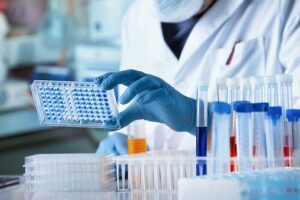
Introduction to Protein A Resin
Protein A resin is an important affinity chromatography medium used widely for the purification of immunoglobulin G (IgG) antibodies from various sources such as serum, ascites fluid, and cell culture supernatant. Protein A, a bacterial protein first identified in Staphylococcus aureus, has a high affinity for binding the Fc region of IgG molecules, making it a useful tool for selective IgG purification.
Mechanism of IgG Binding
The binding mechanism between Protein A and IgG relies on non-covalent interactions between the Fc region of IgG antibodies and the five IgG-binding domains within the Protein A molecule. Each IgG-binding domain contains conserved amino acid residues that interact strongly with the CH2 and CH3 regions of the IgG Fc. This specific binding allows Protein A resin to effectively capture IgG from complex biological samples with high capacity, selectivity, and yield.
Applications in Antibody Purification
Due to its ability to selectively and efficiently bind IgG, Protein A resin finds widespread use in the downstream processing of antibodies. Some key applications include:
– Purification of polyclonal IgG from serum or ascites fluid. As the Fc-binding domains show equal affinity for IgGs from various animal species, Protein A is commonly used to isolate polyclonal rabbit, goat, sheep, and guinea pig antibodies.
– Purification of monoclonal antibodies produced by hybridoma cells or Chinese hamster ovary (CHO) cells. Protein A affinity chromatography allows large-scale, high-yield purification of monoclonal antibodies from cell culture supernatants.
– Purification of recombinant monoclonal antibodies for clinical use. Regulatory guidelines require highly purified monoclonal antibody drug products, a need effectively met by Protein A-based capture during downstream processing.
– Sample clean-up prior to other purification steps. Protein A can remove IgG contaminants from samples before ion exchange or hydrophobic interaction chromatography steps to enrich for target proteins.
Advantages over Other IgG Purification Methods
Compared to conventional protein purification approaches such as ammonium sulfate precipitation, ion exchange, and gel filtration chromatography, Protein A affinity chromatography offers key advantages for IgG purification:
– Highly specific interaction with IgG yields antibodies of >95% purity in a single step. Other methods require multiple steps to achieve similar purity levels.
– Fast and efficient binding kinetics allow purification of IgG from large volumes of crude sample quickly.
– Wide working pH range of 2-9 and compatibility with various buffers facilitate method optimization.
– Convenient regeneration and re-use of Protein A resin minimize material costs compared to single-use alternatives.
Commercial Protein A Resins
There are numerous Protein A resins commercially available from vendors optimized for different purification needs. Common resins include:
– MabSelect Protein A resin developed specifically for monoclonal antibody purification gives high binding capacity, yield, and purity.
– CaptoTM Protein A resin has a highly cross-linked agarose structure for higher mechanical stability and pressure limits.
– HiTrapTM rProtein A FF columns offer ready-to-use pre-packed columns for small-scale purification.
– MabSelect SuRe resin has ultra-high binding capacity for high titer, high viscosity antibody feeds.
– Capto adhere resin allows mild elution conditions and recycling of antibodies through its hydrophilic surface.
Optimizing Protein A Purification Protocols
Effective Protein A purification requires optimization of several parameters to maximize antibody yield, purity, and activity:
– Sample load conditions (pH, conductance, flow rate) affect antibody binding capacity.
– Washing conditions remove non-specifically bound impurities. A multi-step washing protocol with changing buffers may improve purity.
– Elution conditions (pH, ionic strength changes or competitive binding polypeptides) impact antibody recovery and activity.
– Column pre-equilibration buffers condition the resin before antibody capture.
– Sample dilution or concentration adjustment ensure resin capacity is fully utilized.
With proper optimization and scale-up approaches, Protein A affinity chromatography can routinely deliver >90% pure antibodies suitable for numerous downstream applications. Overall, its selectivity, robustness, and versatility have made Protein A resin the gold standard for IgG purification.
*Note:
1. Source: Coherent Market Insights, Public sources, Desk research
2. We have leveraged AI tools to mine information and compile
